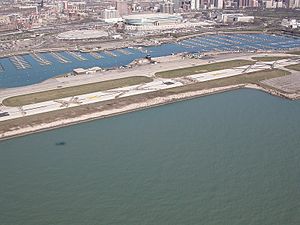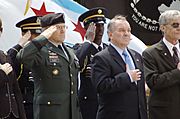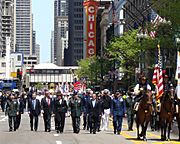Richard M. Daley facts for kids
Quick facts for kids
Richard M. Daley
|
|
|---|---|
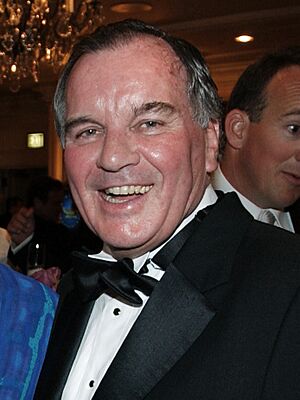
Daley in 2006
|
|
| 54th Mayor of Chicago | |
| In office April 24, 1989 – May 16, 2011 |
|
| Deputy | Terry Gabinski Bernard Stone |
| Preceded by | Eugene Sawyer |
| Succeeded by | Rahm Emanuel |
| 54th President of the United States Conference of Mayors | |
| In office 1996–1997 |
|
| Preceded by | Norm Rice |
| Succeeded by | Paul Helmke |
| Cook County State's Attorney | |
| In office December 1, 1980 – April 24, 1989 |
|
| Preceded by | Bernard Carey |
| Succeeded by | Cecil Partee |
| Member of the Illinois Senate from the 23rd district |
|
| In office January 10, 1973 – December 1, 1980 |
|
| Preceded by | Edward Nihill |
| Succeeded by | Timothy F. Degnan |
| Personal details | |
| Born |
Richard Michael Daley
April 24, 1942 Chicago, Illinois, U.S. |
| Political party | Democratic |
| Spouse |
Margaret Ann Corbett
(m. 1972; died 2011) |
| Children | 4, including Patrick |
| Parents |
|
| Relatives | John P. Daley (brother) William M. Daley (brother) Patrick Daley Thompson (nephew) |
| Education | Providence College DePaul University (BA, JD) |
| Signature |  |
Richard Michael Daley (born April 24, 1942) is an American politician. He served as the 54th mayor of Chicago, Illinois, from 1989 to 2011. Daley was first elected mayor in 1989. He was reelected five times. He chose not to run for a seventh term. His 22 years as mayor were the longest in Chicago's history. He served longer than his father, Richard J. Daley, who was mayor for 21 years.
As mayor, Daley took charge of the Chicago Public Schools. He worked to boost tourism in the city. He also oversaw the building of Millennium Park. He increased efforts to protect the environment. The city's downtown area and nearby neighborhoods grew rapidly under his leadership. He also expanded benefits for city workers to include their partners, regardless of gender. He supported stricter gun control laws.
Daley faced criticism during his time as mayor. Some felt that his family, friends, and political allies received too many city contracts. He started his term with city budget surpluses. However, he left the city with large financial problems. His budgets led to the biggest deficits in Chicago's history. He was a national leader in privatization. This meant he leased or sold public assets to private companies. This helped reduce budget problems temporarily. But it also removed future sources of income for the city. This contributed to the city's financial difficulties when he left office. Daley was known for being "tough on crime." He oversaw the creation of one of the largest police surveillance systems in the country. However, concerns about police brutality were also a recurring issue during his time as mayor.
Contents
- Early Life and Family
- Starting His Political Journey
- Mayor of Chicago (1989–2011)
- After Being Mayor
- Awards and Recognition
- See also
Early Life and Family
Richard M. Daley is the fourth of seven children. He is the oldest son of Richard J. and Eleanor Daley. His father later became Mayor of Chicago in 1955. Richard M. Daley was born on April 24, 1942. He grew up in Bridgeport. This is a historic neighborhood on Chicago's South Side.
Daley has several siblings who are also involved in public life. His brother, William M. Daley, served as White House Chief of Staff. He was also a United States Secretary of Commerce under President Bill Clinton. Another brother, John P. Daley, is a commissioner for Cook County. His brother Michael Daley is an attorney.
Daley was married to Margaret "Maggie" Corbett. She passed away on Thanksgiving Day, November 24, 2011. She had been battling metastatic breast cancer for ten years. Maggie Daley Park in the Chicago Loop is named in her honor. Her nonprofit organization, After School Matters, continues to help young people in Chicago. Richard and Maggie Daley had four children: Nora, Patrick, Elizabeth, and Kevin. Their second son, Kevin, died at age two in 1981 from complications of spina bifida. Daley was raised Roman Catholic.
Education and Early Career
Daley graduated from De La Salle Institute high school in Chicago. He earned his bachelor's degree from DePaul University in 1964. He had previously attended Providence College in Providence, Rhode Island for two years.
Daley later earned a Juris Doctor degree from DePaul University. He passed the Illinois Bar Examination on his third try. He once said, "I flunked the bar exam twice. I had to keep studying harder and harder and harder. I passed it the third time." Daley never actually worked as a trial lawyer.
Starting His Political Journey
Daley was first elected as a delegate in 1969. This was for the Illinois Constitutional Convention. This convention created the current Constitution of Illinois. Voters approved it in 1970.
After his father passed away in 1976, Daley took over his father's role. He became the 11th Ward Democratic committeeman. This is a party position. His brother John P. Daley later took over this role in 1980. A Daley has held this position for 60 years.
Serving in the Illinois State Senate (1972–1980)
Daley was elected to the Illinois Senate in 1972. He served there until 1980. He had the support of the Democratic political organization. As a State Senator, Daley rarely spoke to reporters. He did not hold a news conference for six years. He chaired the Senate Judiciary Committee.
Cook County State's Attorney (1981–1989)
In 1980, Daley ran for Cook County State's Attorney. He challenged the current Republican, Bernard Carey. Daley won this election. He served as State's Attorney from 1981 to 1989. His victory was very close, by only about sixteen thousand votes.
Concerns about police actions were raised during his time as State's Attorney. In 1982, a doctor reported that a suspect had been tortured by police. The doctor wrote to the Chicago Police Superintendent. The Superintendent forwarded the letter to State's Attorney Daley. No charges were brought against any officers at that time.
First Mayoral Campaign: 1983
In November 1982, Daley announced he would run for mayor for the first time. He was one of three main candidates in the Democratic primary. The others were the current Mayor Jane Byrne and Congressman Harold Washington. Daley finished third in the race. Some of his father's political allies believed Daley split the vote. This allowed Washington to become Chicago's first black mayor.
Second Mayoral Campaign: 1989 Victory
Mayor Washington passed away in office on November 25, 1987. The Chicago City Council then appointed Alderman Eugene Sawyer as mayor. This was until a special election could be held in 1989. Daley announced his candidacy on December 6, 1988. He said he wanted to bring people together and run the government well.
Rahm Emanuel helped Daley's campaign with fundraising. David Axelrod was the campaign strategist. William Daley was the chief strategist. Daley defeated Sawyer in the primary election. In the 1989 general election, Daley faced Republican candidate Edward Vrdolyak and Alderman Timothy C. Evans. Daley won the general election on April 4, 1989. He became Mayor of Chicago on April 24, 1989, which was his 47th birthday.
Mayor of Chicago (1989–2011)
First Term (1989–1991)
Daley's first budget proposal for 1990 included $3 billion in spending. It also featured a $25 million reduction in property taxes. He continued a hiring freeze started by Mayor Sawyer. He also started a recycling pilot program. Daley became the first Chicago Mayor to lead Chicago's Gay and Lesbian Pride Parade in 1989. In December 1990, Amnesty International released a report. It called for an investigation into allegations of police torture in Chicago between 1972 and 1984.
Second Term (1991–1995)
On April 2, 1991, Daley was reelected for his second term. This was his first full four-year term. He won with 70.7% of the vote. A 1994 survey of experts on Chicago politics ranked Daley as one of the city's ten best mayors up to that time.
Third Term (1995–1999)
Daley took control of the Chicago Public Schools system in 1995. He appointed Paul Vallas to lead it. When Vallas left, Daley chose Arne Duncan. Duncan later became the U.S. Secretary of Education under Barack Obama. On March 19, 1997, the Chicago City Council passed an ordinance. It made employee benefits available to same-sex partners of City employees. Daley said this was about fairness.
A public issue during this term involved the resignation of Alderman Patrick Huels. Huels was Daley's City Council floor leader. Concerns were raised about Huels' business dealings and city contracts. Daley stated that Huels "did the right thing resigning." He also said he had no knowledge of Huels' private business. Daley then announced new ethics rules for city contracts. He wanted to prevent conflicts of interest.
Fourth Term (1999–2003)
On February 23, 1999, Daley was reelected for his fourth term. He won with 68.9% of the vote. In August 1999, Amnesty International released a report. It raised concerns about police actions in Chicago. These included improper interrogation tactics and excessive force.
Another issue involved city contracts. A company called Windy City Maintenance Inc. was formed shortly after Daley became mayor. Federal investigations later led to charges against some individuals. They were accused of winning city contracts by falsely claiming their companies were owned by women and minorities. Daley denied steering contracts to these companies. By 2002, more than a third of the City Council's 50 aldermen had been initially appointed by Daley. This made the Council very supportive of the mayor's plans.
Fifth Term (2003–2007)
On February 26, 2003, Daley won reelection for his fifth term. He received 78.5% of the vote. Daley supported same-sex marriage. He said in February 2004 that he would have "no problem" with Cook County issuing marriage licenses to gay couples. Time magazine named Daley as one of the best mayors in the United States in 2005. They described his leadership style as "imperial." In May 2006, the United Nations Committee Against Torture noted "limited investigation and lack of prosecution" into allegations of torture by the Chicago Police Department. They called for thorough investigations. Daley was inducted into the Chicago Gay and Lesbian Hall of Fame in 2006.
Meigs Field Demolition
There was a long-standing agreement to keep Meigs Field open. This was a small airport on Northerly Island. However, Daley ordered its demolition shortly after his 2003 reelection. On March 30, 2003, city crews dug large X's into the runway. This trapped planes at the airport. The city's aldermen, the Illinois Governor, and federal agencies were not consulted.
Daley explained that doing it "any other way would have been needlessly contentious." He argued the airport was a threat to Chicago's tall buildings. The Federal Aviation Administration fined the city $33,000 for not giving proper notice. The city also repaid $1 million in misspent federal airport grants.
City Contracting Concerns
The Hired Truck Program was a major issue during Daley's time as mayor. This program hired private truck companies for city work. Investigations revealed that some companies were paid for little or no work. Some also had ties to city employees or paid bribes. Daley's second cousin was involved in a company that participated in this program. This company leased a truck back to the city that the city had just sold. The program was later changed and then ended.
Another issue involved Daley's son, Patrick R. Daley. He was an intern at a firm that won city contracts. Patrick and his cousin formed a company that invested in one of these ventures. They did not disclose their ownership as required by city ethics rules. The company's city contract was extended by millions of dollars. Patrick later received payments from the sale of another venture that had a city contract for airport Wi-Fi service. Daley stated he did not know about his son's involvement. He called it "a lapse in judgment."
The Park Grill restaurant in Millennium Park also caused controversy. An operating company with many investors, including some of Daley's friends, won a contract to run the restaurant. Critics called it the "Clout Cafe." Daley later criticized the deal himself.
Leasing Public Assets
Daley's administration made deals to lease public infrastructure. In 2006, a company paid the city $1.83 billion for the right to operate the Chicago Skyway and collect tolls for 99 years. Later that year, another company paid Chicago $563 million for a 99-year lease of the city's parking garages. Daley said these deals were good for taxpayers. However, some critics argued that governments might not use such large sums of money wisely. They also noted that these deals removed future income sources for the city.
Sixth Term (2007–2011)
In September 2008, Chicago tried to lease Midway International Airport for 99 years. The deal was for $2.52 billion. However, it fell apart due to the 2008 financial crisis. In 2008, the city leased its parking meter system for 75 years for $1.16 billion. This was to help with a growing budget deficit. The agreement quadrupled parking rates. It also extended the hours people had to pay for parking. The city also agreed to pay the new owners if any roads with meters were closed. Within three years, most of the money from this lease was spent.
Failed Olympic Bid
In 2007, Daley signed ten-year contracts with city labor unions. This was to prevent labor problems as Chicago tried to host the 2016 Summer Olympics. Daley promoted the economic benefits of hosting the games. Many thought this would be a highlight of his career. However, on October 2, 2009, Chicago was the first of four finalists to be eliminated. This was a big disappointment for Daley.
Gun Control Stance
Daley was a strong supporter of gun control. He was a member of the Mayors Against Illegal Guns Coalition. This group was formed in 2006. He often spoke about the need to keep dangerous weapons off the streets.
The US Supreme Court heard a case called McDonald v. Chicago in 2010. This case challenged handgun bans in Chicago. On June 28, 2010, the Supreme Court ruled that the Second Amendment to the United States Constitution protects an individual's right to "keep and bear arms" from local governments. This meant Chicago's handgun ban was unconstitutional. Daley quickly called a special meeting of the city council. They approved a revised gun control ordinance. It included city firearms licenses.
Budget Challenges
Daley started his term with a city that had good finances. It had revenue-generating assets and manageable debt. However, he left the city with a large structural deficit. This was estimated at $1.2 billion when pension funds were included. The Daley administration often spent more money than it took in each year. In August 2010, Fitch Ratings lowered the city's bond credit rating. They pointed to the city using reserve funds for daily expenses and under-funding its pension funds. They also noted that the city faced rising costs but lacked plans for new income.
The city's budgets continued to grow, even after the Great Recession began. They reached over $6 billion a year. When under-funded employee pension funds were included, the city's annual deficit was over $1 billion. In October 2010, Daley projected a deficit of $655 million for 2010. This was the largest in the city's history.
Deciding Not to Run Again
Daley's approval rating was at a low of 35% by late 2009. On September 7, 2010, Daley announced he would not seek a seventh term. He said, "I've always believed that every person, especially public officials, must understand when it's time to move on. For me, that time is now." On December 26, 2010, Daley became Chicago's longest-serving mayor. His term ended on May 16, 2011. Rahm Emanuel succeeded him as mayor.
Approval Ratings
| Segment polled | Polling source | Date | Approve | Disapprove | Sample size | Margin-of-error | Polling method | Citation |
|---|---|---|---|---|---|---|---|---|
| Registered voters | Market Shares Corp. (commissioned by Chicago Tribune/WGN-TV) | August 27–31, 2009 | 35% | 47% | 300 | ±5 | ||
| Chicago Tribune | July 2009 | 37% | 47% | |||||
| Bennett, Petts, & Normington (commissioned by SEIU Illinois State Council) | March 23–25, 2009 | 50% | ±4.3 | Telephone | ||||
| 2007 | 41% | |||||||
| Registered voters | Market Shares Corp. (commissioned by Chicago Tribune/WGN-TV) | February 10–13, 2006 | 56% | 33% | 700 | ±4 | ||
| Chicago Tribune | November 2005 | 61% | ||||||
| Registered voters | Market Shares Corp. (commissioned by Chicago Tribune/WGN-TV) | May 16–18, 2005 | 53% | 33% | 700 | ±4 | ||
| Registered voters | Market Shares Corp. (commissioned by Chicago Tribune/WGN-TV) | January 31–February 3, 2003 | 72% | 16% | 700 | ±4 | Telephone | |
| 1999 | 79% | |||||||
| Registered voters | Market Shares Corp Commissioned by Chicago Tribune | May 13–18, 1993 | 66% | 29% | 399 | ±3 | Telephone | |
| Likely voters | Market Shares Corp. and Chicago Tribune | February 9–11, 1991 | 75% | 20% | 600 | ±4 | Telephone | |
| Likely voters | Market Shares Corp. and Chicago Tribune | January 11–14, 1991 | 80% | 16% | 600 | ±4 | Telephone | |
| Southtown Economist | December 1990 | 61% | ||||||
| Chicago Sun-Times | November 1990 | 58% | ||||||
| Adults | Market Shares Corp. and Chicago Tribune | October 24–25, 1989 | 68% | 14% | 500 | ±4 | Telephone |
His Impact on Chicago
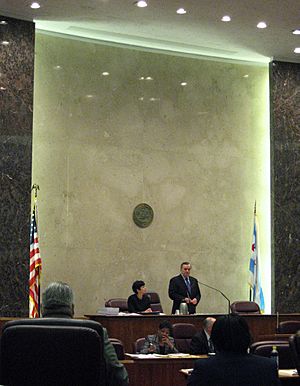
Daley received support from Chicago's business community. He was sometimes criticized for focusing city resources on downtown businesses. Some felt he neglected other neighborhoods, especially those with lower incomes. However, he worked to connect with all Chicagoans. He appointed diverse people to high positions. He also focused on providing services to all neighborhoods. He oversaw the removal of old public housing projects. He also pushed for reforms in the public school system.
Daley focused on making Chicago a popular tourist spot. He improved and expanded parks. He added flower planters along many main streets. He oversaw the creation of Millennium Park from an old train yard. He also led the effort to turn Navy Pier into a popular tourist destination. Daley supported immigration reform and green building initiatives. He received an Honor Award in 2009 for his work in sustainability. Chicago avoided some of the worst economic problems seen in other Midwest cities.
After Being Mayor
After leaving office, Daley became a "distinguished senior fellow" at the Harris School of Public Policy at the University of Chicago. He also joined an international law firm, Katten Muchin Rosenman LLP. This firm had received legal work from the city when he was mayor. He also joined a speakers bureau. This allowed him to give paid speeches. Daley was on the board of directors for The Coca-Cola Company from 2011 to 2019.
Currently, Daley is a managing principal at Tur Partners LLC. This is an investment firm. His son, Patrick Daley, is also a principal there. In 2013, The National Law Journal named Daley one of the "100 Most Influential Lawyers in America." They noted his strong political connections in Chicago. In 2022, Daley's daughter Nora became the chair of the Illinois Arts Council.
In June 2022, Daley was hospitalized in Chicago for a "neurological" illness.
Awards and Recognition
- In 1999, Daley received the Arbor Day Foundation's Lifetime Stewardship Award.
- In 2002, he received the Golden Plate Award from the American Academy of Achievement.
- In 2017, Daley received the ULI Chicago Lifetime Achievement Award.
See also
 In Spanish: Richard M. Daley para niños
In Spanish: Richard M. Daley para niños
- Electoral history of Richard M. Daley
- Timeline of Chicago, 1980s–2010s
 | Sharif Bey |
 | Hale Woodruff |
 | Richmond Barthé |
 | Purvis Young |


